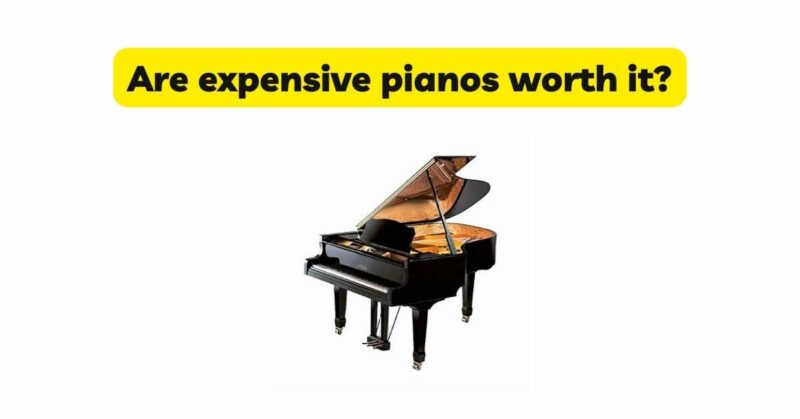The enchanting sound of a piano can transport us to a world of musical bliss. For aspiring pianists and seasoned musicians alike, the decision to invest in an instrument is of utmost importance. When it comes to pianos, the market offers a wide range of options, from budget-friendly models to luxurious, high-end instruments with hefty price tags. This article delves into the question: Are expensive pianos worth it? By exploring various factors, such as craftsmanship, sound quality, longevity, and personal preference, we aim to unravel the keys to musical excellence.
Craftsmanship and Quality:
One of the primary distinctions between expensive and budget pianos lies in the craftsmanship and quality of materials used. High-end piano manufacturers employ experienced artisans who meticulously craft each instrument, ensuring precision, attention to detail, and superior construction. From the selection of premium woods for the soundboard and keys to the intricate action mechanisms, expensive pianos often showcase impeccable workmanship that can enhance playing experience and longevity.
The Sound: A Symphony under Your Fingers:
The sound of a piano is its soul, and it is in this aspect that expensive pianos truly shine. Renowned manufacturers invest significant time and resources into perfecting the tonal qualities of their instruments. These pianos often feature unique designs, refined voicing techniques, and superior materials that contribute to their distinct and captivating sound. The richness, depth, and responsiveness of the keys are meticulously calibrated, resulting in a playing experience that is both expressive and gratifying.
Longevity and Investment Value:
A notable advantage of investing in an expensive piano is its longevity and potential for investment value. Handcrafted with top-notch materials and fine-tuned with precision, these instruments are built to withstand the test of time. Their robust construction ensures stability, minimizing the risk of structural issues over the years. Furthermore, due to their reputation and limited production, high-end pianos often retain their value or even appreciate over time, making them a solid investment for serious musicians and collectors.
Personal Preference and Playing Experience:
While craftsmanship, sound quality, and longevity are crucial aspects to consider, personal preference plays an undeniable role in determining the worth of a piano. Each pianist has unique preferences when it comes to touch, responsiveness, and tonal characteristics. What may sound extraordinary to one musician may not resonate with another. It is vital to try out a variety of pianos, both expensive and budget-friendly, to discover the instrument that resonates with your musical style, technique, and artistic vision.
The Art of Musicianship:
For professional musicians and pianists dedicated to their craft, the emotional connection between the artist and the instrument becomes an essential element. Expensive pianos often possess intangible qualities that can inspire and elevate musical expression. They can evoke emotions, enhance creativity, and empower musicians to reach new heights in their performances. The sheer joy and inspiration derived from playing a remarkable instrument may justify the investment for those who value the pursuit of musical excellence.
Budget Considerations and Alternatives:
While expensive pianos undeniably offer a myriad of advantages, it is essential to consider one’s budget and alternatives. Not everyone can afford the luxury of a high-end piano, and there are exceptional options available across different price ranges. Manufacturers often produce mid-range pianos that offer a balance of quality and affordability, making them a viable choice for many musicians. Additionally, the secondhand market provides an opportunity to find well-maintained, used pianos that may meet one’s requirements at a more accessible price point.
Conclusion:
The decision to invest in an expensive piano ultimately depends on various factors, including craftsmanship, sound quality, longevity, personal preference, and budget considerations. These high-end instruments often excel in their construction, sound, and potential investment value, providing an unparalleled playing experience and inspiring musicians to reach new artistic heights. However, it is crucial to remember that the worth of a piano lies in its ability to ignite a musician’s passion, serve as a trusted companion in their artistic journey, and become an instrument that resonates with their soul. Whether an expensive piano is worth it or not is a deeply personal decision that requires careful consideration of individual needs, aspirations, and financial circumstances.


